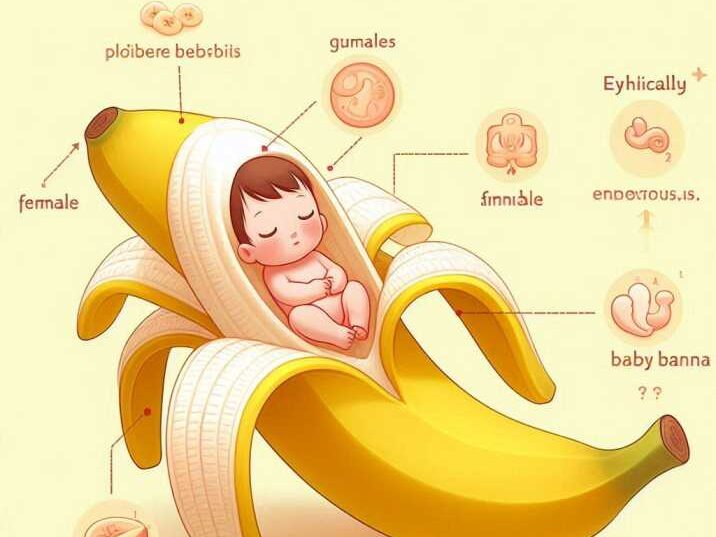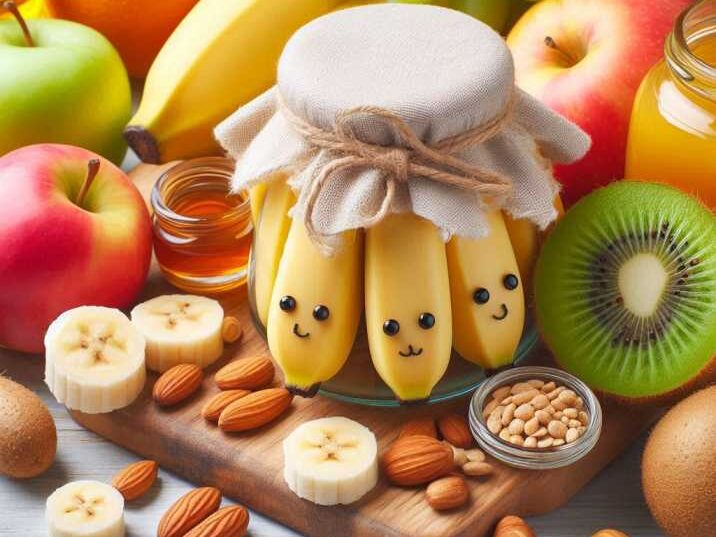Introduction
Table of Contents
When it comes to giving infants the best nutritional start, parents often wonder about the right foods to aid their baby’s growth. Baby bananas, a smaller version of regular bananas, are packed with nutrients and are often easier for infants to handle and digest. This article explores how baby bananas support infants’ growth and development and why these mini fruits make a great snack for little ones.

Key Benefits of Baby Bananas for Infants
1. Brain Development
The Vitamin B6 found in baby bananas plays an important role in the development of the brain. This vitamin helps regulate mood and sleep, and it contributes to brain functions essential for learning.
2. Strong Muscles and Bones
Potassium and magnesium are crucial for muscle strength and bone health. Since infants are growing rapidly, these minerals help their bones and muscles develop properly.
3. Improved Digestion
Baby bananas are rich in dietary fiber, which can help prevent constipation, a common issue among infants. Fiber keep digestion smooth, making it easier for infants to absorb other essential nutrients.
4. Boosted Immune System
The Vitamin C in baby bananas strengthens the immune system, reducing the risk of infections and illnesses. This vitamin also plays a role in tissue growth and repair, aiding overall health.
5. Natural Energy Source
Baby bananas provide natural sugars that give infants a quick energy boost, ideal for active play and exploration. The natural sweetness also makes baby bananas a favourite snack for many babies.
How to Introduce Baby Bananas to Infants
When to Introduce Baby Bananas
It’s recommended to introduce baby bananas around 6-8 months when infants are beginning to explore solid foods. Parents can start with small, mashed pieces to ensure easy swallowing.
Serving Ideas for Baby Bananas
Mashed Baby Bananas: Mashing baby bananas creates a smooth, creamy texture that’s easy for infants to swallow. This simple preparation makes it ideal for early eaters who are still learning how to chew. Packed with natural sweetness and essential nutrients, mashed banana can be served alone or mixed with a bit of breast milk or formula for added flavour and familiarity.
Banana Slices: For babies who have developed the ability to grasp, banana slices are a perfect finger food. Cut the banana into small, bite-sized pieces to avoid choking risks and help infants practice self-feeding. Soft and easy to chew, these pieces encourage hand-eye coordination and make an enjoyable snack.
Smoothies: Blending baby bananas with fruits like apples, pears, or berries creates a smoothie full of vitamins and antioxidants. This nutrient-rich beverage can be a refreshing option on warmer days or when infants are ready for mixed flavours. Smoothies provide a fun way to introduce new fruits while ensuring babies get essential nutrients.
Mixed with Cereal: Adding mashed baby bananas to infant cereal enhances both taste and nutritional value. The bananas add natural sweetness, which can make cereal more appealing to babies. This combination offers the benefits of iron-fortified cereals with the additional vitamins from bananas, making it a balanced meal for growth and development.

Safety Tips for Feeding Baby Bananas
Avoid Choking Hazards: When feeding baby bananas to infants, always slice the fruit into very small, thin pieces or mash it thoroughly. Large chunks can be a choking hazard since infants are still developing their chewing skills. Serving bananas in small, manageable pieces or as a mash makes it safer and easier for babies to swallow, reducing any risk.
Watch for Allergic Reactions: Although rare, some infants may have an allergy to bananas. Signs of an allergic reaction could include symptoms like a rash, itching, swelling, or even digestive upset. After introducing baby bananas, keep a close eye on the baby for any unusual reactions, and consult a pediatrician if any symptoms appear. Monitoring for allergies helps ensure that baby bananas are safe and enjoyable for the child.
Watch for Allergic Reactions: Although rare, some infants may have an allergy to bananas. Signs of an allergic reaction could include symptoms like a rash, itching, swelling, or even digestive upset. After introducing baby bananas, keep a close eye on the baby for any unusual reactions, and consult a pediatrician if any symptoms appear. Monitoring for allergies helps ensure that baby bananas are safe and enjoyable for the child.
The Nutritional Value of Baby Bananas
Baby bananas are rich in essential nutrients that play a vital role in the growth and development of infants. Here’s a look at the key nutrients in baby bananas and their benefits:
| Nutrient | Benefits for Infants |
|---|---|
| Potassium | Helps maintain muscle strength, nerve function, and fluid balance |
| Vitamin C | Supports immune function and tissue repair |
| Vitamin B6 | Assists in brain development and mood regulation |
| Dietary Fiber | Aids in digestion and prevents constipation |
| Natural Sugars | Provides a quick source of energy |
| Magnesium | Strengthens bones and supports healthy teeth |
| Antioxidants | Protect cells from damage and boost immune health |
Conclusion
Baby bananas can be a nutritious and convenient addition to an infant’s diet, offering essential vitamins and minerals that support brain development, muscle strength, digestion, and immune health. With their natural sweetness and soft texture, baby bananas are not only easy for infants to eat but also enjoyable. Introducing them in safe, small portions—whether mashed, sliced, or blended into other foods—ensures babies benefit from their nutrients without the risk of choking. Always monitor for any allergic reactions and follow safe serving practices to make baby bananas a healthy and delicious part of your baby’s growth journey.
Frequently Asked Questions
Q1: When can I start giving baby bananas to my infant?
A: Baby bananas can be introduced around 6-8 months.
Q2: Are baby bananas safe for infants?
A: Yes, they are safe when sliced or mashed and offer multiple health benefits.
Q3: How many baby bananas can my infant eat per day?
A: One small baby banana per day is generally sufficient for infants; consult a pediatrician for exact amounts.
Q4: Can baby bananas cause allergies in infants?
A: Banana allergies are rare, but it’s best to introduce them slowly and observe for any reaction.
Q5: How should I store baby bananas to keep them fresh?
A: Store baby bananas in a cool, dry place. For longer storage, they can be refrigerated.
